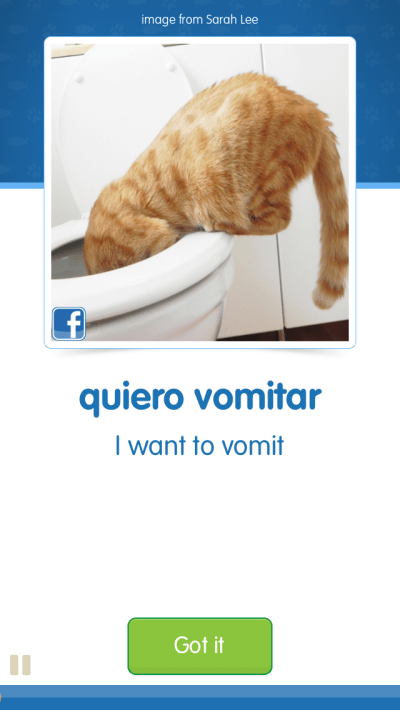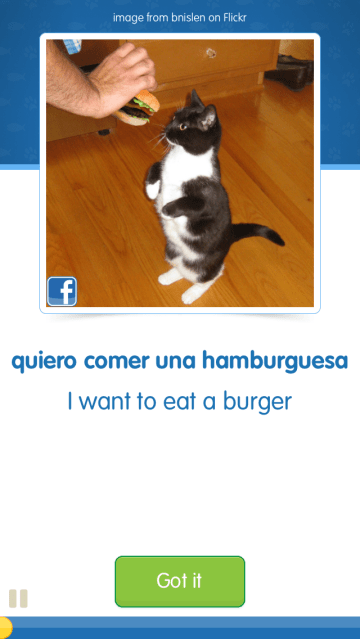 The day after I meet Memrise‘s COO Ben Whately, to get a preview of the language learning startup’s new app, I’m out for a Saturday morning run when the image of a brilliant ginger cat with its head stuck down the toilet sails into my head.
The day after I meet Memrise‘s COO Ben Whately, to get a preview of the language learning startup’s new app, I’m out for a Saturday morning run when the image of a brilliant ginger cat with its head stuck down the toilet sails into my head.
Quiero vomitar, says a voice in my head. I carry on running, and a few paces further down the road another image of a cat materialises — this time a tabby with a pair of cute white mittens, one of which is hiding its face. No estoy bien.
If I’d doubted Whately’s lengthy Friday afternoon pitch about the power of cute — and specifically cute cats — to aid memory recall I’m in no doubt now. Quiero comer una hamburguesa, I mutter disbelievingly. Not a phrase I usually pay much attention to, being vegetarian.
The image of a cat, standing on its hind legs begging for a bite of hamburger, gnaws at me all the way home.
Meet Cat Spanish by CatAcademy, a new iOS app from language learning startup, Memrise, best known (prior to this feline foray) for its eponymous crowdsourced mnemonic creation platform. Memrise’s founding team has a background in psychology, neuroscience and memory-related research. CatAcademy draws on some of the technology and techniques the startup uses in that platform but stands on its own two feet as a separate (paid) app that’s reaching out to a new audience.
CatAcademy is not an app for people who are actively searching for language learning apps — indeed, Whately argues those people will probably end up finding and using the Memrise app. Rather it’s after language learning procrastinators; people who may have fancied learning Spanish but always find themselves firing up Angry Birds instead. Even people who’ve never entertained the idea.
“Our aim is to make learning a language genuinely accessible to everyone,” Whately tells TechCrunch. “Language learning needs to compete with other forms of procrastination. It’s not enough to just be accurate and be effective and efficient; it actually needs to be captivating.”
CatAcademy’s competition, as Memrise sees it, is the mobile games that people kill time with on the trip to work, rather than actual language learning apps like Duolingo — because of the type of person it’s aiming to attract.
Hence the app’s sleight-of-hand name: Cat Spanish (i.e. nothing so boring-sounding as a human language).
CatAcademy sticks its furry neck out to be fun and non-judgemental, rather than dull and tedious. It’s gamified language learning that deploys a variety of cunning techniques — based on Memrise’s own research, plus the wider science around learning and memory retention — to make it easier and even fun to learn to speak another language.
How specifically does it do this? After my cat-festooned run, I’d like to say witchcraft but in fact, says Whately, it’s a combination of cute photos of cats, subtle humour, structured lessons that are designed to be consumed in short, spaced bursts (for which a mobile app is of course the perfect vehicle) and to stretch the learner at just the right point. It also uses reviews to go over your bad bits until the memory sticks.
“There’s a lot of research that shows, if people are at the point of a test — and some people have just crammed the day before, and some people have been learning just a little bit, spaced out, then on the day of the test they can all be the same, but six weeks later there’s a massive, massive difference,” says Whately.
Getting the spacing right is also important. “The dream moment is if you have a tip of the tongue experience — and then you remember. Then you’ve strengthened the memory a lot,” he adds. “The converse is actually true too.”
And while repeated testing may sound boring, CatAcademy’s light, furry touch keeps things fun — it never tells you how many times you need to review something, for instance (since putting a number on it may be off-putting). The app’s gentle puzzle-style game mechanic, which mainly consists of looking at cat photos which illustrate particular words or phrases to help you memorise them, followed by multiple choice and matching tasks to go over and reinforce the learning, is also designed to walk users through lessons without feeling too much like homework.
We’re a scientific group, and data driven — but the data did drive us towards cats.
Another technique CatAcademy uses to enhance the learning delivered via the app is to encourage users to apply a phrase that they have learnt within a lesson — such as Quiero comer una hamburguesa — in a slightly atypical context, later on, so they have to make a “slight leap of imagination” to connect the two. That means they learn to lean out, towards a more conversational application of language, rather than learning a set of phrases that they can only apply in very narrow use-cases, says Whately.
So, for instance, instead of the app asking something obvious like: ‘You see a McDonald’s, what do you say?’ and then requiring the user to pick out the obvious hamburguesa phrase, it will encourage the user to apply their knowledge more broadly. So that lead-in might read something more like: ‘You’ve arrived in America, and start feeling hungry…’ Ah-ha! Quiero comer una hamburguesa!
Again, the idea is to prevent nuggets of fresh, fragile knowledge from crumbling away through sheer boredom.
The app generally involves tapping on cat photos and/or matching Spanish words/phrases to the corresponding photo, or selecting the correct word/phrase from a multiple choice list. It provides both the visual look of the foreign words (and their English translation), and also the sounds, via an audio section, to aid pronunciation.
But there’s no requirement for users to pronounce words themselves by talking back to the app, or to spell out words or write whole phrases from memory. Whately stresses that they wanted to steer clear of a situation in which your phone is telling you off. Because again, that wouldn’t be a whole lot of fun.
He also points to research that suggests language learning benefits from not requiring the learner to overstretch themselves by asking them to do too much, too soon. Rather it’s been shown to be more effective if you give people time to absorb words and phrases at their own pace. Aka: “listen and decode — rather than produce”.
 “It’s really easy to create an app that tests you and then constantly makes it as though it’s judging and assessing you. The point of testing is to strengthen your memories. It is not to test you,” he says, adding: “It should be totally non-judgemental.”
“It’s really easy to create an app that tests you and then constantly makes it as though it’s judging and assessing you. The point of testing is to strengthen your memories. It is not to test you,” he says, adding: “It should be totally non-judgemental.”
So the ultimate aim of CatAcademy is to inculcate — or inculcat, in truth — conversational level Spanish without its users feeling like there’s anything remotely akin to inculcation going on. Quite a trick to pull off, but if anything can be that sneaky, a cast of cats can.
Of course Cat Spanish is not going to give you the skills to write a PhD thesis en Español but the app contains 1,000 phrases spread across 50 levels and, used regularly, Whately says it can certainly lead to a sound grasp of “conversational, confident Spanish”.
The £0.99 Cat Spanish app is the first of several planned in what will become a CatAcademy series, with Memrise already working on content for Italian, French, German and Portuguese versions.
The startup has a fair amount of funding to fuel CatAcademy. It raised an Angel round from Balderton Capital back in 2010, before joining TechStars’ Boston program in 2011, and raising further funding — including some, fittingly enough, from an investor in lolcat empire, ICanHasCheezburger (many of the photos in CatAcademy have actually been sourced from there — others were located using a Tumblr-based crowdsourcing effort).
Further seed funding came in early 2012, followed by $4 million Series A at the end of last year. Memrise’s total funding to date stands at $6.28 million, according to CrunchBase. Other investors include Lerer Ventures, Avalon Ventures, Ken Baumann and Audrey Capital.
As for Memrise’s crowdsourced visual mnemonics platform, Whately says that now has more than one million visual mnemonics created by its users. In terms of active users, it’s at around 200,000 per month, with one million registered sign ups. Memrise isn’t currently monetising that platform but that will apparently be coming soon — via premium analytics and teacher tools.
Whately confirms that CatAcademy — or something like it — was always on Memrise’s mind since its strategy was always broadly about applying language learning and memory related research to a variety of end-user applications, not just building out a crowdsourced visual mnemonics empire. So you can’t accuse them of a cat-themed pivot.
Indeed, Memrise’s crowdsourced platform actually provided the initial spark that led it to arrive at cats as the expressive, velvet-coated, fun-loving teachers to staff out its Academy, after analysing which kinds of visual mnemonics were working best for people on the Memrise platform.
“What we found, however we sliced it, was that pictures of cats — cute pictures specifically, of which over 50% were cats — just kept on coming out as the most effective mnemonics,” he says. “We then looked further into the research around that. There is quite a lot of inevitably Japanese research into the effects of cuteness on cognition. They found that it improves performance in cognitive tasks. It also, self evidently, is incredibly powerful at attracting attention.”
Cats are incredibly powerful at creating positive emotion.
Memrise then tested this cat-based language learning thesis earlier this year, with a simplified “proof of concept” app — which was downloaded about 8,000 times over the six-week test period. The test app achieved a 71% day-one retention rate; 55% one-week retention; and 30% one-month retention. Aka the sort of rates that successful mobile games achieve, says Whately.
“Cats are incredibly powerful at creating positive emotion. And so we thought this is a fairly unique opportunity: they’ve got the property of improving your concentration, and your performance on cognitive tasks, they attract your attention, they’re funny — and humour has been shown repeatedly again to increase your memory, not only of the joke itself, but of information that is connected to the joke,” he says. “They also have a huge expressive range — which I think is part of the reason they are popular on the Internet.”
And so CatAcademy was born.
“I have to admit we were slightly sceptical to begin with,” he adds. “We’re a scientific group, and data driven — but the data did drive us towards cats.”
